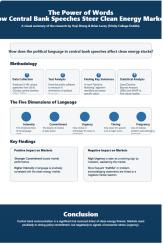央行官员的政治话语是清洁能源市场的推动者
IF 6.9
2区 经济学
Q1 BUSINESS, FINANCE
Research in International Business and Finance
Pub Date : 2025-08-01
DOI:10.1016/j.ribaf.2025.103126
引用次数: 0
摘要
我们研究了央行行长演讲中的政治语言如何影响中美两国市场的清洁能源市场动态。使用先进的文本分析(poldis)和一种新颖的词汇匹配算法,我们测量了政策话语的关键维度——真实性、紧迫性、时机、强度和承诺。这些基于语音的指标通过极限边界分析(EBA)和SHAP值可解释性与传统市场和媒体变量相结合。研究发现,政策承诺和力度较强的演讲与清洁能源股票的表现正相关。相反,高紧迫性和较短的时间间隔往往预示着较弱的市场结果,潜在地向投资者发出风险或不稳定的信号。我们的研究结果强调了央行沟通在塑造可持续金融市场投资者情绪方面的重要但微妙的作用。因此,本研究通过量化政治话语如何推动清洁能源等新兴行业的资产定价,为金融经济学、行为金融学和政策沟通研究做出了贡献。本文章由计算机程序翻译,如有差异,请以英文原文为准。

Central bankers’ political discourse as a driver of clean energy markets
We investigate how political language in central bank governors’ speeches affects clean energy market dynamics in both the Chinese and U.S. markets. Using advanced textual analysis (poldis) and a novel lexical matching algorithm, we measure key dimensions of policy discourse—authenticity, urgency, timing, intensity, and commitment. These speech-based indicators are integrated with traditional market and media variables through Extreme Bounds Analysis (EBA) and SHAP value interpretability. We find that speeches with stronger policy commitment and intensity are positively correlated with clean energy stock performance. Conversely, high urgency and shorter timing intervals often predict weaker market outcomes, potentially signaling perceived risks or instability to investors. Our results highlight the significant but nuanced role of central bank communication in shaping investor sentiment within sustainable finance markets. This research therefore contributes to financial economics, behavioral finance, and policy communication studies by quantifying how political discourse can drive asset pricing in emerging sectors like clean energy.
求助全文
通过发布文献求助,成功后即可免费获取论文全文。
去求助
来源期刊

Research in International Business and Finance
BUSINESS, FINANCE-
CiteScore
11.20
自引率
9.20%
发文量
240
期刊介绍:
Research in International Business and Finance (RIBAF) seeks to consolidate its position as a premier scholarly vehicle of academic finance. The Journal publishes high quality, insightful, well-written papers that explore current and new issues in international finance. Papers that foster dialogue, innovation, and intellectual risk-taking in financial studies; as well as shed light on the interaction between finance and broader societal concerns are particularly appreciated. The Journal welcomes submissions that seek to expand the boundaries of academic finance and otherwise challenge the discipline. Papers studying finance using a variety of methodologies; as well as interdisciplinary studies will be considered for publication. Papers that examine topical issues using extensive international data sets are welcome. Single-country studies can also be considered for publication provided that they develop novel methodological and theoretical approaches or fall within the Journal''s priority themes. It is especially important that single-country studies communicate to the reader why the particular chosen country is especially relevant to the issue being investigated. [...] The scope of topics that are most interesting to RIBAF readers include the following: -Financial markets and institutions -Financial practices and sustainability -The impact of national culture on finance -The impact of formal and informal institutions on finance -Privatizations, public financing, and nonprofit issues in finance -Interdisciplinary financial studies -Finance and international development -International financial crises and regulation -Financialization studies -International financial integration and architecture -Behavioral aspects in finance -Consumer finance -Methodologies and conceptualization issues related to finance
 求助内容:
求助内容: 应助结果提醒方式:
应助结果提醒方式:


